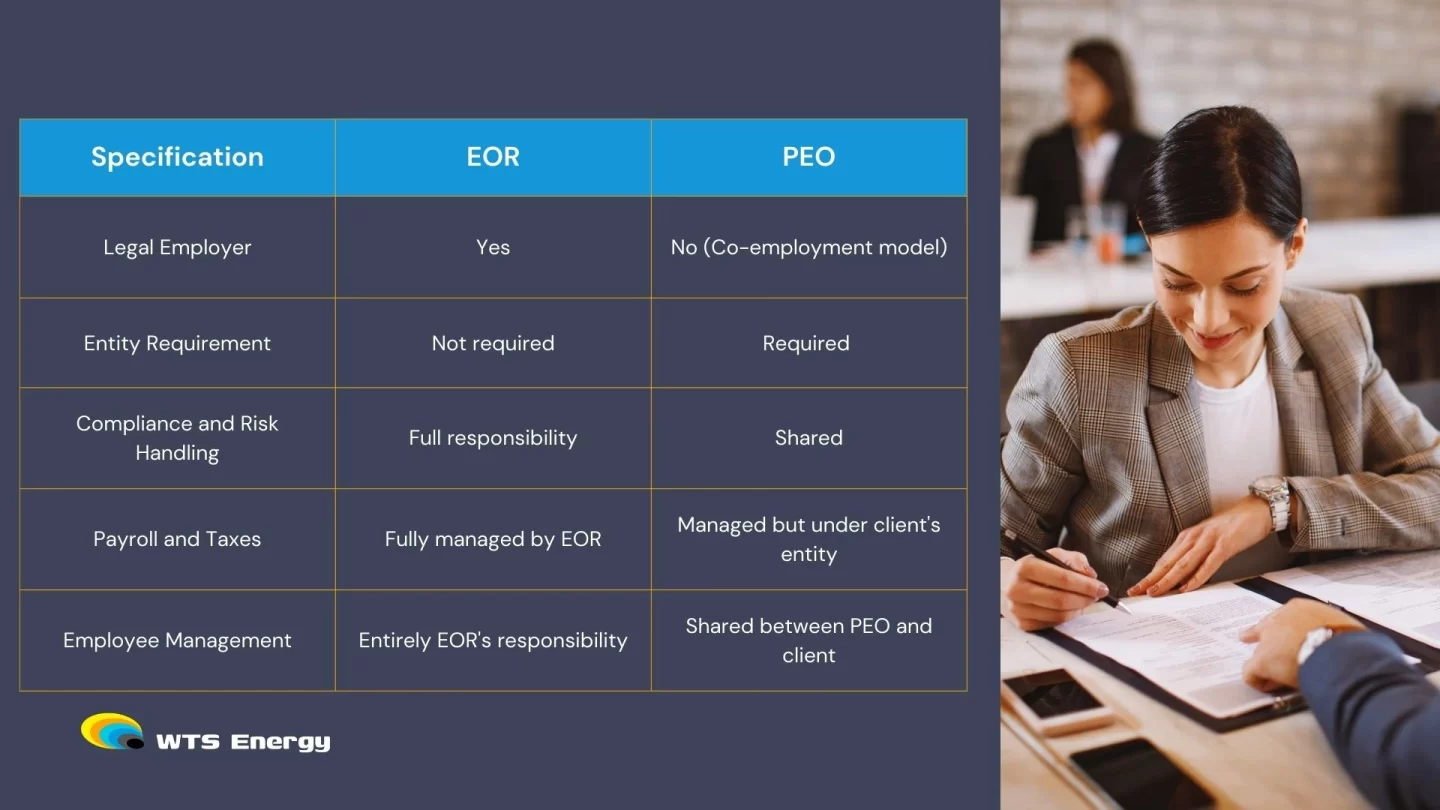Expanding globally comes with its own share of difficulties, especially in managing employment responsibilities. Two popular models used in global hiring are the Employer of Record (EOR) and Professional Employer Organization (PEO). While both can help businesses navigate compliance and employment, their scope and operations differ quite a bit.

What is an employer of record (EOR)?
An Employer of Record is a third-party organization that takes full legal responsibility for employing workers on behalf of another company in a specific country.
An EOR includes:
Legal Employment
The EOR serves as the official employer for tax and compliance purposes.
Payroll Management
Handles salary payments, tax deductions, and social contributions.
Compliance
Ensures adherence to local labour laws and reduces the risk of legal issues.
Reduced risk:
Helps companies navigate regulatory changes and geopolitical challenges.
The EOR model is particularly useful for businesses expanding into countries where they do not have a local entity. This allows them to expand internationally and hire faster, whilst still ensuring full compliance with local employment regulations.
What is a professional employer organization (PEO)?
A PEO is a co-employment arrangement where the organization shares employer responsibilities with the client company.
A PEO includes:
Co-Employment
The PEO and client company share employment responsibilities. The business retains control over day-to-day management, while the PEO handles HR-related tasks.
Payroll and Benefits
Like an EOR, a PEO can manage payroll, taxes, and benefits administration.
Limited Scope
Unlike an EOR, a PEO requires the client to establish a legal entity in the country of operation.
Liability
In the case of a PEO, the company is still liable for legal and compliance issues.
This model works best for companies that already have or are willing to establish a local presence.
Key differences in responsibilities
An EOR takes on full legal responsibility for employment, making it an ideal choice for businesses without a local presence. In contrast, a PEO operates through a co-employment model, which can be more suitable for businesses that already have a legal entity and want to streamline HR functions without releasing full control over employee management.

Benefits of using an EOR vs a PEO
An EOR is particularly advantageous for businesses looking to enter new markets quickly and efficiently. By eliminating the need to establish a local entity, an EOR allows for rapid market entry and takes full responsibility for compliance, including payroll, taxes, and legal requirements. This reduces the risk of fines or legal disputes and provides businesses with the ability to test new markets, stay competitive, or manage short-term workforce needs.
On the other hand, a PEO is more suitable for businesses that already have an established local entity and are seeking to optimize their HR functions. The cost-effective nature of a PEO allows companies to streamline payroll and compliance processes without incurring the higher costs associated with full legal responsibility. Additionally, the PEO model offers shared control which allows businesses to retain operational oversight of their workforce while outsourcing administrative tasks.
Choosing between an EOR and PEO
Selecting between an EOR and PEO depends on your business needs:
EOR is ideal for:
- Rapid market entry without establishing a legal entity.
- Short-term or project-based employment needs.
- Companies looking to reduce their liability when entering new markets abroad.
PEO is ideal for:
- Companies with a local presence looking to streamline HR functions.
- Businesses seeking shared responsibility for employment compliance.
Legal implications of EOR and PEO
The legal responsibilities of EOR and PEO differ significantly. An EOR assumes full legal responsibility for compliance, handling employment contracts, tax filings, and adherence to local labor laws, which reduces the burden on the client. In contrast, a PEO operates under a shared liability model, where the client retains some responsibility and risks related to non-compliance.
Expanding into new markets requires a clear understanding of your employment responsibilities. While PEOs provide a partnership model for companies with an existing presence, EORs offer a fully outsourced solution for hiring in new countries.




